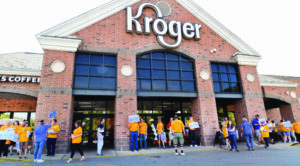By Conor Kelley
When Kroger rolled out a faulty new payroll system in late 2022, their workers missed millions of dollars worth of paychecks. As the 4th largest grocery store chain in the country, Kroger employs 465,000 workers in the US, most on the brink of poverty.
Now, six months later, the problem still isn’t fixed—and while Kroger is focusing on its proposed $25 billion acquisition of Albertsons, workers are left paying the price.
In September of last year, the company rolled out a new scheduling system called MyTime. This, along with moving from an outdated HR system to a cloud-based one, would unify the different payroll systems used by its nearly 2,800 stores—at least in theory.
But in the words of Tricia Halpin, an HR rep for Kroger-owned chain Fred Meyer, it’s been a disaster: “Given the widespread and systemic nature of the payroll discrepancies at issue in this case, it is possible that every employee who received a paycheck under the new payroll system has been affected to some degree.”
Workers have reported their paychecks were incorrect in nearly every way: the hours they worked, their hourly rate, their taxes, their vacation and sick pay—the list goes on and on.
“It was the first pay period of October, and I didn’t get a paycheck. Nothing directly deposited into my bank. And I thought, ‘that’s odd,’” says Kathy Coy from Portland, OR, who has worked for Kroger for 23 years.
Latonya Davis from Jericho, WV, remembers her first missed paycheck, too.
“That paycheck was missing from October 6th until maybe a couple days before Christmas,” Davis says. “Thanksgiving was right around the corner.”
The scope of the failure is staggering. Though they’ve refused to confirm just how many employees were affected nationwide, in a court filing Kroger stated that through December 30, 2022, just one of the many grocery chains they own, Fred Meyer, received a total of 1,658 separate payroll complaints.
The company claims they moved quickly to issue reimbursements, but workers tell a different story. Thousands of employees started reporting these payroll issues in late September by contacting their unions and Kroger HR reps. But many workers said that despite notifying their HR reps and calling Kroger corporate, they were given excuses and other numbers to call and people to contact.
“We were given a 1-800 Kroger helpline,” Coy says, “And the first time I called, I was on hold for two hours.” The experience left her feeling “angry and just hopeless.”
“They gave me an 800 number to call,” Davis says. “I called it every week. Every week. And there was no resolution.”
According to statements from the company and affected workers, Kroger began issuing one-time payments for random amounts, some in the form of prepaid Visa gift cards. Coy received a gift card for $500. For her, “it almost felt like a bribe for us to not say anything about it.”
According to UFCW Local 555, which represents some of these workers, one worker was repaid with what they were told was one of these $500 prepaid gift cards. There was only $250 on the card.
Workers are feeling disillusioned after missing paychecks and having to fight to get back the money they were owed. “It was a slap in the face,” says Davis.
Kroger did not respond to a request to comment for this story.
“It’s particularly bad for Kroger workers to miss a paycheck because many of the workers are struggling to survive,” says Sean Embly, Staff Director for UFCW 3000.
A recent report surveying over 10,000 Kroger employees found 78% are food insecure and 14% are homeless or have been in the past year. According to a leaked 2017 memo obtained by More Perfect Union, Kroger knew 1 in 5 of its store associates were on government assistance.
These are people who can’t afford to miss a paycheck, and couldn’t wait for the company to repay them at their leisurely pace.
So, after months of waiting, on January 19th, a group of current and former Kroger employees filed a class-action lawsuit in federal court in Richmond, Virginia. More lawsuits across the country followed soon after.
The grocery giant now faces four class-action lawsuits from current and former employees (1, 2, 3, 4) in 12 states. These lawsuits may force Kroger to pay more than what they withheld from their employees, as well: in Virginia and Ohio, two of the states where these suits are filed, courts can award up to three times the amount owed if a company is found guilty of wage theft.
Congress has added some pressure as well.
In February, Senators Warren, Sanders, and Wyden sent a letter to Kroger’s CEO Rodney McMullen demanding answers. “Given our concerns regarding your company’s treatment of workers and your proposed merger that would further adversely impact them,” the letter said, “we request a full accounting of how this widespread wage theft occurred, and what steps you plan to take to compensate your workers prior to any merger with Albertsons.”
McMullen still hasn’t responded.
In a court filing, Halpin gave a “conservative estimate” that Kroger has issued reimbursements totaling over $1.3 million dollars, but admitted there were “at least several thousand additional payroll errors and affected employees” the company had not yet remedied.
And new errors continue.
“At the beginning it felt like this was maybe a one week, one payroll issue and it was gonna get corrected,” Embly says. “But now we’re sitting here about six months later and we’re still dealing with payroll issues.”
“Today I just checked my pay stub,” Coy says, “and they’ve double charged me on the health copay again. It’s very defeating.”
This colossal—and continued—failure comes as Kroger attempts to merge with Albertsons to become the nation’s second largest grocery chain behind Walmart, a move that could make workers’ lives even worse.
This proposed merger would subject almost half a million more employees to this faulty payroll system. “I think it’s important to think about the company who’s already really big, getting bigger and how difficult it’s gonna be for them to run their company if they’re already having trouble simply paying their workers,” says Embly.
It would likely drive up prices for consumers as well. Why? Because that’s what happens every time grocery store chains merge.
“We should be asking ourselves, is this the type of company that as customers we want to be putting our trust in to be able to deliver food for our family to eat?” Embly says.
Kroger CEO Rodney McMullen—who makes over 900 times his average worker’s pay—told Congress in recent months that a Kroger-Albertsons merger would somehow do the impossible: lower grocery prices, increase worker pay, and wouldn’t result in a single person getting laid off.
But McMullen doesn’t even pay his workers what they’re owed, so who’s foolish enough to believe that?


